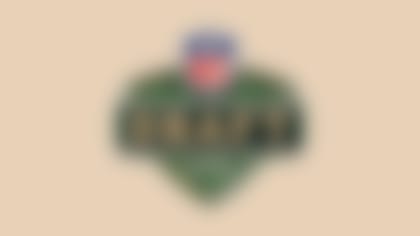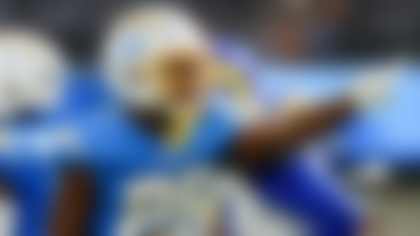The NFL Scouting Combine is viewed as a glorified track meet by some observers, but scouts and coaches view the event as a four-day job interview. Personnel men will bombard top prospects with a variety of questions to assess their background profile and football character heading into the NFL. Although these interviews are cross-referenced with discussions with former coaches, administrators and teammates, the 15- to 30-minute conversations play a significant role on the final evaluations.
Given the importance of the interview process, I thought I would put on my scout's hat and come up with a pressing question for 10 of the most intriguing prospects in the draft. While I don't know how each player will respond, I can give you an idea of how teams will approach the interview process in Indianapolis to get to the answers needed to make solid assessments going forward.
Without further ado, here's what these players can expect to hear in meeting rooms at the combine:
1. Jadeveon Clowney, DE, South Carolina
Question: Do you love football?
Answer I would like to hear: The Gamecocks' star entered the season as the consensus No. 1 prospect in the 2014 class, but a disappointing junior campaign has scouts concerned about his concentration, focus and work ethic. Clowney seemingly cruised through games this season, showing little enthusiasm and hustle for long stretches. Additionally, he sat out a game due to injury (Kentucky) when a miscommunication with the coaching staff led to questions about his willingness to play through bumps and bruises. With a pair of speeding tickets leading to more concerns about his maturity, I would sit across from Clowney and pepper him with questions about his desire and work ethic. I would expect Clowney to defend his position with conviction. I hope he would talk about some of his short-term goals, while also discussing his desire to lead a team to the championship. If Clowney sufficiently covers those topics with his response, I would feel better about his overall potential as a top pick and potentially a franchise player in the NFL.
2. Johnny Manziel, QB, Texas A&M
Question: Do you want to be a star or a champion?
Answer I would like to hear: The former Heisman Trophy winner is unquestionably one of the biggest stars of this generation. The 21-year-old playmaker defied the odds when he captured college football's most prestigious honor as a redshirt freshman. The recognition as college football's top player made him a celebrity worthy of enjoying the company of Drake and Lebron James during the offseason. With social media capturing every moment of his reported playboy lifestyle, Manziel walks into the NFL combine viewed as a modern day Joe Namath. Now, "Broadway Joe" earned a reprieve for his off-field exploits by guiding the New York Jets to a world title, which is why I would spend most of my interview time pressing Manziel about his long-term goals as a player. I would like to know where football ranks among his priorities, and if he is willing to sacrifice his personal life to maximize his professional career. Additionally, I would ask Manziel to take me through his personal preparation leading up to game day to see how much time he spends in the film room and weight room getting ready to perform. These characteristics are essential to success at any position, but they are critical to succeeding as a young quarterback in the NFL. Finally, I would ask Manziel about his leadership style and how he inspires his teammates on the field. Looking at him from afar, he appears to me an energetic player with a demonstrative personality, but I would like to hear him describe how he galvanizes the team with his play, words or both on the field.
3. Marqise Lee, WR, USC
Question: Why did your production slip dramatically in 2013?
Answer I would like to hear: Lee was considered the most explosive playmaker in college football following the 2012 season. The former Biletnikoff Award winner dominated the Pac-12 as a "catch-and-run" specialist with exceptional speed, quickness and power. Those skills made him a favorite in the NFL scouting community heading into the fall, but a disappointing junior campaign has seemingly altered Lee's standing among a deep and talented collection of receivers in the 2014 class. If I had a chance to sit with Lee at the combine, I would ask him to explain the challenges of playing at USC with a coach on the hot seat and a set of inexperienced quarterbacks driving the offense. I would want to see how the turmoil affected his daily attitude and preparation. Additionally, I would want to see if he was accountable for his role in the team's failures or if he put the blame on his teammates or coaches. Finally, I would ask Lee about his health and how much that impacted his ability to play at a high level. If Lee owned up to his shortcomings on the field (concentration lapses and drops) without using quarterback play or questionable coaching decisions as an excuse, I would feel better about Lee lacking the "diva" persona that accompanies most receivers entering the league.
4. Khalil Mack, OLB, Buffalo
Question: How will you adjust to the increased competition in the NFL?
Answer I would like to hear: Mack finished as one of the most disruptive defenders in college football. He set new marks for tackles for losses and forced fumbles in a career, while showcasing a game that overwhelmed opponents in the MAC. Now, I certainly respect the level of competition and the NFL players that have come from that conference. But I'm a little leery of taking small-school standouts early in the draft due to the adjustment required to play in the NFL. Although some small-school stars have certainly thrived in the NFL, the league is dominated by players from top conferences. As a result, I would ask Mack about his concerns about playing on a bigger stage. Naturally, he will probably point to his strong performances against Ohio State, Connecticut and Baylor as validation of his big-game potential. However, I would counter by suggesting both opponents lacked a blue-chip player on the front line. Additionally, I would inquire about his decision to decline an invitation to play in the Reese's Senior Bowl -- a game that features the "best of the best" in the 2014 class. I would want to know if he was attempting to hide a flaw in his game or simply avoiding injury risk by refusing to play in the game. How Mack responds to this line of questioning would give me an indication of his competitiveness and allow me to understand his approach to playing against elite players in key matchups.
5. Darqueze Dennard, CB, Michigan State
Question: What makes you the best cover corner in the 2014?
Answer I would like to hear: The best cornerbacks in the NFL play with an extraordinary amount of confidence that often exceeds their natural talents. This swagger or cockiness drives some evaluators crazy, but most defensive coaches prefer to have an edgy defender on the perimeter. Dennard is a shutdown defender on the collegiate level, but scouts that I've spoken with have serious reservations about his top-end speed and athleticism. The concerns have led some scouts to question his ability to hold up against elite NFL receivers. Based on that information alone, I would spend most of my interview time asking Dennard about the strengths and weaknesses of his game. I would want to know how he masks his deficiencies on the field, and how he will attempt to improve upon those flaws as a pro. Additionally, I would ask Dennard to point out a few difficult matchups that he encountered during his time at Michigan State. By pointing out his worst performances, I would be able to study the film of his approach and reaction to adversity, while also determining which kinds of receivers give him problems on the edge. If Dennard delivers a genuine self-assessment, I would be encouraged by his ability to figure how to succeed as a cover corner despite his athletic deficiencies.
6. Ra'Shede Hageman, DT, Minnesota
Question: What is your best defensive position?
Answer I would like to hear: Hageman is a freakish athlete with all of the physical tools to become a great NFL player. Measuring 6-foot-7, 311 pounds with basketball player-like agility and quickness, he is a dynamic athlete with J.J. Watt-type potential. However, I rarely saw him play to that level at Minnesota. As a result, I head to the combine wondering if he is a better athlete than player at this point of his career. To see where Hageman stands in his development, I would ask him to name his best position on the defensive line. He has aligned anywhere from the 1-technique (shaded NT) to the 7-technique (outside shade of OT), but never found a consistent home at any spot. I would ask him which spot best fit his skills and how should a team use him as a pro. Additionally, I would inquire about his inconsistent motor and why he didn't play with great effort in some games. While I certainly respect Hageman's talent and see the potential, I recognize that the NFL game is hard and it requires a ton of mental toughness to succeed over the long haul. How Hageman responds to my questions would not only give me an indication of his resiliency, but it would help me craft a plan to best utilize him at the next level.
7. Will Sutton, DT, Arizona State
Question: Did your added weight negatively affect your game in 2013?
Answer I would like to hear: After dominating the Pac-12 with a game built on speed and quickness, Sutton looked nothing like the league's Defensive Player of the Year in 2013. He looked sluggish on the field and didn't show the same kind of explosiveness that jumped off the tape the previous season. Talking to scouts and coaches familiar with Sutton, they cited a significant weight gain as key factor in his struggles. Sutton reportedly played his senior season at 330 pounds, after spending most of his career tipping the scales a little under 300. I would ask Sutton if the weight gain added to his game or diminished his greatest assets (speed and quickness). Additionally, I would inquire about his sluggish performance to see if there were any mitigating factors that led to the disappointing campaign. If Sutton displays the self-awareness to recognize his declining performance in 2013, I would be encouraged by his ability to critically evaluate his own game. I would also hope that he has learned to tune out the noise from outside, and put more effort into accentuating the positives of his game. Although Sutton isn't a fit for every defensive scheme, he certainly has the ability to play well at the next level if he stays true to his game. He needs to convince me that he understands that when we meet.
8. Michael Sam, DE, Missouri
Question: Are you comfortable moving to OLB as a pro?
Answer I would like to hear: The Missouri standout will face a number of questions at the combine regarding his revelation that he is gay, but most scouts and coaches are more concerned with how Sam will fit into a defensive scheme at the next level. While he is a productive defensive end in the SEC, he simply lacks the size (6-1, 260) to play with his hand in the ground in the NFL. Thus, teams will spend the majority of their time determining whether he has the athleticism and mental capacity to make a move to linebacker. To get a feel for Sam's willingness to change position, I would ask him if he had any experience playing linebacker at Missouri. I would also see if he was ever used as a drop defender in a zone-blitz scheme during his time with the Tigers. Finally, I would ask him about his performance at the Senior Bowl, and how difficult it was for him to adjust to playing away from the line of scrimmage. While I'm sure he will enthusiastically embrace a position change at the next level, I would ask him if he truly sees himself as a defensive end at the next level. If he does, I would want him to outline a plan for success as a designated pass rusher and how he would compensate for the significant size advantage most offensive tackles would enjoy in matchups on the edge. Although it won't likely change my opinion on his game, it will help me make a better determination on where he should fit on the draft board going forward.
9. Loucheiz Purifoy, CB, Florida
Question: What kept you from playing to your potential this season?
Answer I would like to hear: Purifoy is arguably the most gifted athlete in the 2014 class. He brings ideal size (6-0, 190) to the position, while also displaying exceptional top-end speed and quickness on tape. However, he failed to play like an elite defender in a junior season that was marred by inconsistency and mental lapses. Purifoy not only looked undisciplined in coverage, but he appeared to avoid contact in the running game at times. These traits sent up red flags in the scouting community, leading me to question his desire and motivation heading into the season. I would ask Purifoy about his disappointing performance in 2013. I would ask him about his personal shortcomings and why the team surprisingly struggled despite the presence of several elite players. As one of the leaders on the team, I want to know what he attempted to do to turn things around and why his attempts were unsuccessful. Finally, I would ask him about his love of the game. Does he love playing football? If Purifoy tells me that he loves the game, I would ask him to explain and give me examples of his devotion to the game. I would hope that he would break down how much time he spends in the classroom or weight room preparing each week. If he can convince me that his heart is into succeeding at the highest level, I would be inclined to make a case for him on draft day.
10. Teddy Bridgewater, QB, Louisville
Question: Do you have any concerns about taking punishment at your current size?
Answer I would like to hear: Bridgewater has been declared the most pro-ready quarterback in the class by nearly every evaluator, but concerns about his spindly build have diminished his standing on some boards. Teams are worried about his ability to withstand punishment in the pocket despite his consistent availability at Louisville. Moreover, Bridgewater demonstrated toughness by playing with a broken wrist and sprained ankle at the end of 2012. Of course, I would ask Bridgewater about his weight and any concerns withstanding the pounding in the pocket. Additionally, I would press him on how he would avoid taking big shots from pass rushers on blitzes. Bridgewater will likely counter by pointing out his awareness of hot routes and sight adjustments against pressure, and how he will get the ball out of his hands quickly to avoid sacks or big hits. Ultimately, the official weigh-in will play a major role in Bridgewater's projection, but I would rely on his approach to offseason strength-and-conditioning training as a big factor in my final evaluation.




